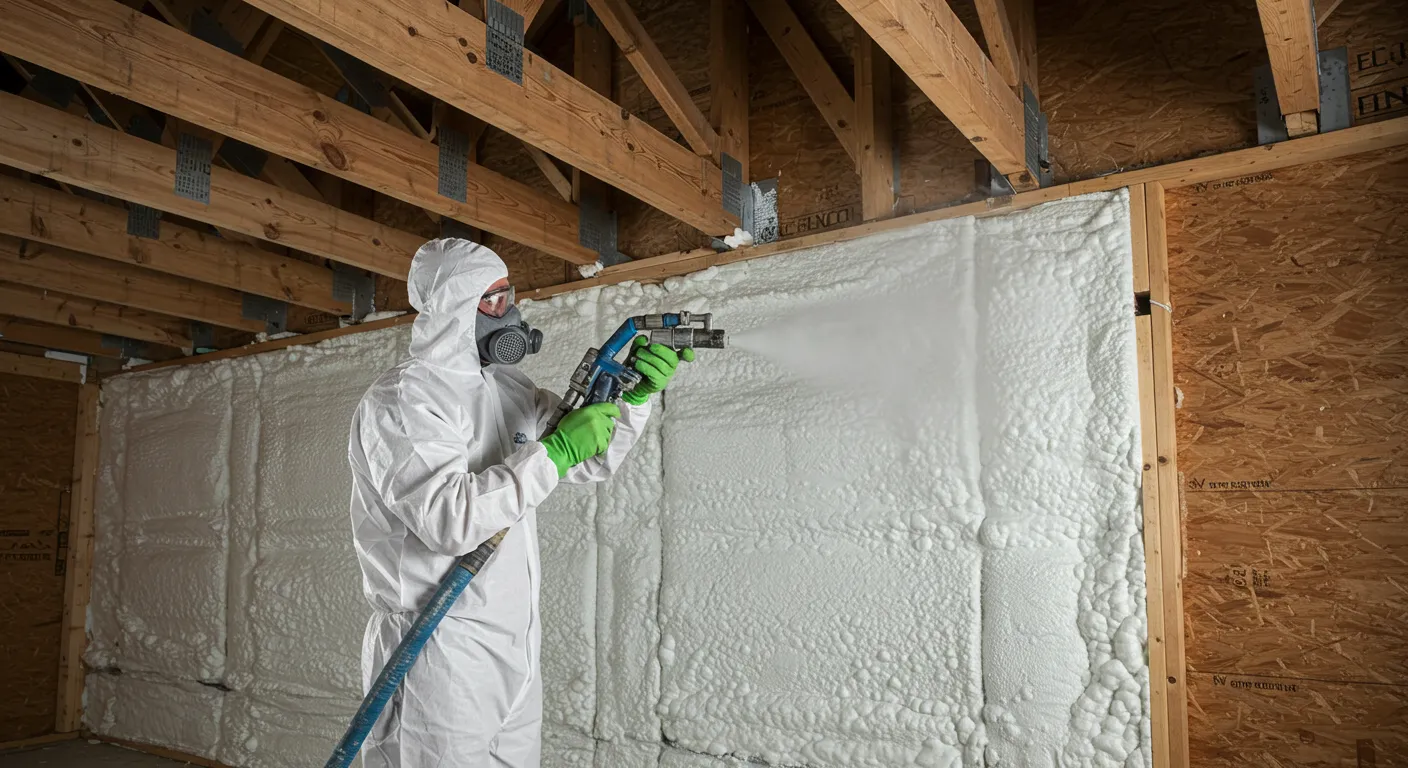Spray foam insulation is a highly effective solution for improving energy efficiency and maintaining indoor comfort. It is commonly used in residential, commercial, and industrial buildings to seal gaps and prevent air leakage. One of the most frequently asked questions about this insulation type is its lifespan—how long does it last, and what factors affect its durability?
What Determines the Lifespan of Spray Foam Insulation?
The longevity of spray foam insulation depends on several factors, including the type of foam used, environmental conditions, and installation quality. There are two primary types of spray foam:
- Open-cell spray foam – More flexible and less dense, ideal for interior applications.
- Closed-cell spray foam – Denser and more rigid, offering superior moisture resistance and structural support.
Both types provide excellent insulation properties, but their lifespan and performance can vary based on usage and exposure conditions.
How Long Can Spray Foam Insulation Last?
Properly installed spray foam insulation can last anywhere between 30 to 80 years, with closed-cell foam typically lasting longer than open-cell foam. Unlike traditional insulation materials like fiberglass or cellulose, spray foam does not sag, settle, or deteriorate quickly. Its durability comes from its ability to resist moisture, prevent mold growth, and maintain its structural integrity over decades.
Factors That Influence Longevity
1. Quality of Installation
The expertise of the installer plays a significant role in determining how long the insulation will last. Proper application ensures uniform coverage, correct expansion, and optimal adhesion to surfaces. Hiring experienced professionals helps prevent common issues such as overexpansion, gaps, or uneven curing.
2. Environmental Exposure
- Temperature fluctuations – Extreme heat or cold can affect the expansion and contraction of the foam over time.
- Moisture levels – While closed-cell foam resists water infiltration, prolonged exposure to high humidity or standing water may reduce effectiveness.
- UV exposure – Direct sunlight can degrade spray foam over time. Proper covering or coatings help mitigate this issue.
3. Material Composition
Higher-quality spray foam products contain stable chemical formulations that resist breakdown. Using certified materials from reputable manufacturers ensures longevity and performance consistency.
4. Structural Movement
Buildings naturally shift due to settling, seismic activity, or external forces. Spray foam insulation remains flexible, adapting to minor movements. However, excessive structural shifts can lead to cracks or gaps in the insulation layer.
Signs That Spray Foam Insulation Needs Replacement or Maintenance
While spray foam is long-lasting, it is not entirely maintenance-free. Here are some signs that may indicate a need for inspection or replacement:
- Visible cracks or shrinkage – Small cracks may appear over time, especially if exposed to excessive temperature changes.
- Water damage – If water infiltration occurs, particularly with open-cell foam, insulation performance may decline.
- Pest activity – Though not a common issue, rodents or insects may damage insulation in certain environments.
- Increased energy bills – If heating and cooling costs rise unexpectedly, insulation performance may be compromised.
Maximizing the Lifespan of Spray Foam Insulation
Regular Inspections
Conducting periodic inspections helps identify potential issues early. Homeowners and property managers should check for visible damage and any changes in energy efficiency.
Proper Ventilation and Moisture Control
Maintaining balanced humidity levels and preventing water intrusion extends the effectiveness of spray foam insulation. Using vapor barriers and proper drainage systems can help in moisture-prone areas.
Professional Reapplication When Necessary
In some cases, additional layers of spray foam can be applied over existing insulation to reinforce its performance. Professional assessment will determine if reapplication is a viable option.
Expert Installation for Long-Lasting Performance
If you are considering spray foam insulation, ensuring professional installation is the key to maximizing its lifespan. Valley Spray Works specializes in high-quality spray foam solutions that enhance energy efficiency and indoor comfort. Contact us at (208) 539-5281 or email [email protected] for expert guidance and installation services.
Frequently Asked Questions (FAQs)
Can spray foam insulation degrade over time?
Yes, but it takes decades. With proper installation and minimal exposure to harsh environmental conditions, spray foam can remain effective for over 50 years.
Does spray foam insulation require maintenance?
Routine inspections are recommended to check for damage, moisture buildup, or structural changes. In most cases, maintenance is minimal compared to traditional insulation types.
Can I install spray foam insulation myself?
DIY application is not recommended. Professional installation ensures proper expansion, adhesion, and long-term durability, preventing costly mistakes.
Is spray foam insulation resistant to mold and pests?
Yes, closed-cell spray foam is highly resistant to moisture, reducing the risk of mold growth. Additionally, its dense structure deters pests from nesting.
What happens if spray foam insulation gets wet?
Closed-cell spray foam resists water absorption, maintaining its insulating properties. Open-cell foam can absorb moisture, potentially leading to reduced effectiveness and requiring replacement.
Does spray foam insulation lose its R-value over time?
Unlike fiberglass or cellulose, spray foam maintains a stable R-value over decades, provided it remains intact and undamaged.
Can spray foam be removed or replaced?
Yes, but removal is labor-intensive. If damaged or outdated, sections of spray foam can be carefully removed and replaced by professionals.
How does spray foam compare to fiberglass insulation in lifespan?
Spray foam lasts significantly longer than fiberglass, which typically requires replacement every 15-30 years due to sagging or degradation.
Is spray foam insulation eco-friendly?
While traditional spray foams contain chemicals, newer formulations focus on sustainability by reducing volatile organic compounds (VOCs) and using renewable resources.
How much does spray foam insulation cost?
Pricing varies based on area size, foam type, and installation requirements. For a precise quote, contact Valley Spray Works at (208) 539-5281.



